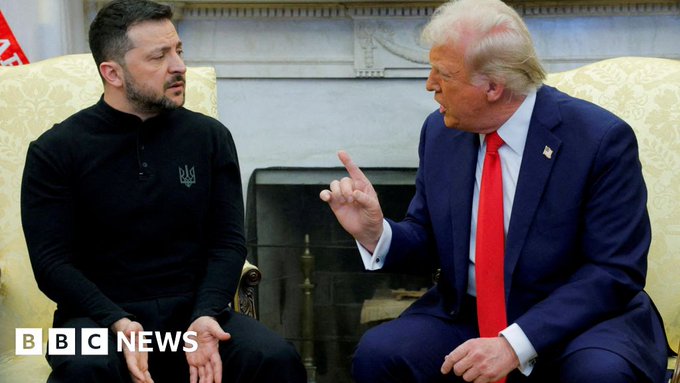President Donald Trump sharply criticized Ukrainian and European leaders on Sunday, just as diplomats from Washington, Kyiv, London, Paris, and Berlin convened in Geneva to renegotiate a controversial 28-point peace proposal aimed at ending the Russia-Ukraine war.
In a post on Truth Social, Trump called the war a “loser for everyone” and accused Ukraine’s leadership of expressing “zero gratitude” for U.S. efforts. He also reiterated that Europe “continues to buy oil from Russia,” a long-standing grievance for the White House.
Trump’s remarks coincided with a high-stakes diplomatic push in Geneva, where Ukrainian security chief Rustem Umerov, along with senior European and American officials, began redrafting key elements of the U.S.-authored peace proposal. The plan has faced backlash across Europe for allegedly offering concessions too favorable to Moscow — including requiring Ukraine to cede territory, limit its military, and abandon ambitions to join NATO.
US and Ukraine Seek Middle Ground
Secretary of State Marco Rubio, speaking after the first day of negotiations, described the Geneva meeting as “probably the most productive and meaningful” in the process so far. He said the delegations reviewed the U.S. proposal “point-by-point,” making adjustments in hopes of narrowing differences.
“Both Ukraine and the United States need to be comfortable with the final wording,” Rubio said, adding that any revised proposal would ultimately require approval from both Trump and Ukrainian President Volodymyr Zelensky.
Umerov confirmed that Kyiv had submitted new counter-proposals. “We appreciate our American partners working closely with us to understand our concerns,” he said on X, expressing cautious optimism for further progress.
Zelensky echoed this sentiment, saying Washington’s plan could incorporate “elements based on the Ukrainian vision” that remain “critically important for Ukraine’s national interests.”
Europe Pushes Back Against Moscow-Friendly Terms
European leaders — including UK Prime Minister Sir Keir Starmer, German Chancellor Friedrich Merz, and European Council President Antonio Costa — have strongly challenged elements of the draft plan. After discussions at the G20 summit in South Africa, they jointly stated that the proposal could serve as “a basis” but required substantial changes.
European governments are particularly alarmed by provisions that would:
Freeze Ukraine’s NATO membership path
Force territorial concessions to Russia
Cap the size of Ukraine’s armed forces
UK Transport Secretary Heidi Alexander, speaking on Sunday, said some parts of the plan were “essential for a just and lasting peace” but insisted that “additional work” was required.
Starmer, who met Trump by phone on Saturday, stressed that the inclusion of an Article 5-style security guarantee — NATO’s mutual defense principle — was “integral and significant” to any final settlement.
A Plan Negotiated Behind Closed Doors
The 28-point draft was reportedly crafted by U.S. envoy Steve Witkoff and Kremlin-linked negotiator Kirill Dmitriev, with Kyiv and European allies largely excluded from early discussions — a detail that has intensified political backlash.
The U.S. State Department pushed back against claims from several senators that the plan represented a “Russian wish list.” A spokesperson insisted the document was “authored by the United States, with input from both the Russians and Ukrainians.”
Deadline and Diplomatic Pressure
Trump had initially demanded that Ukraine respond by Thursday, though he has since suggested room for negotiation, responding “no” when asked whether his proposal was final.
Downing Street confirmed that Trump and Starmer would continue discussions, while Zelensky reiterated the UK’s “steadfast support” for Kyiv.
With Washington, Kyiv, and Europe now scrambling to rewrite the deal, the Geneva talks represent the most intense diplomatic effort yet to reshape a peace plan that could determine the future of the conflict.
Whether the revised agreement will satisfy all parties — especially Russia — remains uncertain. But for now, negotiators are racing against time, political pressure, and deep geopolitical divisions to reach what Trump has described as a “just and lasting peace.”








